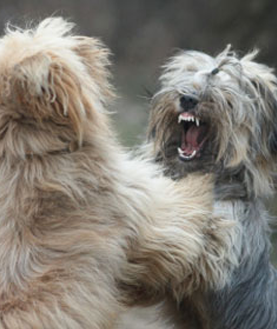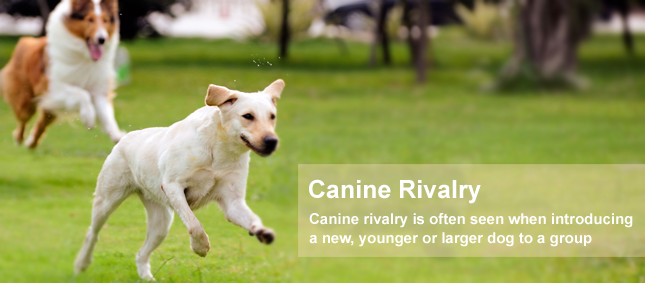Canine Rivalry
Canine rivalry: Few terms conjure as many negative feelings from good pet owners as this. Canine rivalry is generally defined as repeated aggression between dogs (as opposed to isolated instances). It can present as anything from simple growling to out-and-out fighting. Dogs position themselves within a group naturally; actions like standing over, play bowing, mounting, rolling over and many others all serve to establish natural orders. Sometimes, however, conflicts do not resolve themselves, becoming overwhelming and dangerous for both human and canine. These negative situations can be reinforced if appropriate action is not taken. This article presents a couple common causes of canine rivalry as well as suggesting some things to do as well as not to do.
Canine rivalry is often seen when introducing a new, younger or larger dog to a group. In this situation, both new and existing dogs need to learn where in the pack dynamic they belong. Natural changes like a puppy’s maturation or an adult dog’s aging or death can also cause rivalry as new orders are established. Remember, even domesticated dogs exist within a complex social structure. Where a pup sleeps, who drinks first when fresh water is put out, who stands closest to the gate when a stranger arrives, all these things indicate an established order.
The most important thing you can do to relieve stress and reduce rivalry is spay or neuter your pets. The second most important  thing you can do is exercise your animals. When introducing a new pup, do so on neutral ground (like a park or open field). Reward friendly and“gentlemanly” behavior (when a young dog defers to an older one). Be aware of and avoid potential triggers. Actions like throwing a tennis ball or handing out treats should not initiate conflict; if it does, stop, realize what is happening, and think about how to correct it.
thing you can do is exercise your animals. When introducing a new pup, do so on neutral ground (like a park or open field). Reward friendly and“gentlemanly” behavior (when a young dog defers to an older one). Be aware of and avoid potential triggers. Actions like throwing a tennis ball or handing out treats should not initiate conflict; if it does, stop, realize what is happening, and think about how to correct it.
The worst thing you can do in situations like these are to punish any pup. People should not try to interfere with a pack’s social structure. Dogs thrive on social structure. Don’t anthropomorphize feelings like fair and equal. Finally, don’t be afraid to consult a professional dog trainer if you or your family feels threatened; they can be very helpful.






